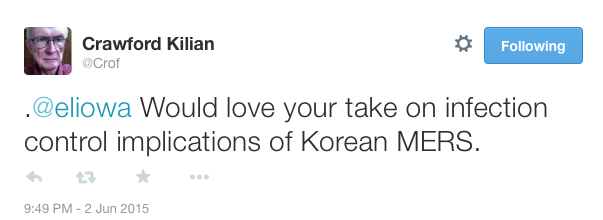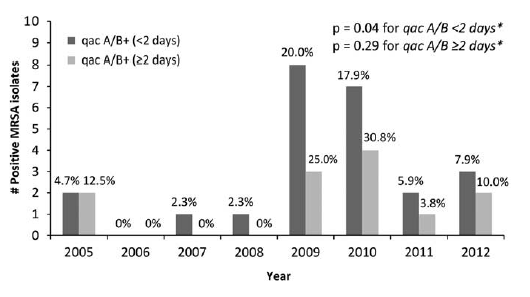MERS in S. Korea and Infection Control
I've been thinking about this all week, and came to the conclusion that I don't have much of a take on the latest outbreak. Surprising, I know, given how we are the number one "therapeutically abrasive blog"* on the interweb. With that said, I want to counter a meme I've seen emerging.
In Nature News today there was an article and a quote from David Heymann, chair of Public Health England, that I found a bit concerning. He said, “The focus on South Korea would be better directed towards Saudi Arabia.” It appears to me that the article and he are suggesting that it's more important to study episodic animal-to-human transmission than to focus on human-to-human infection control. I think this is a poor choice (or perhaps a poor choice of words) for a number of reasons. First, it is unlikely that prevention activities in Asia compete for research dollars with epidemiological investigations in the Middle East - we can and should do both! Second, in the case of MERS, CDC has estimated that more than 90% of cases could be linked to health care exposures. So, if we care about preventing incident human cases, public health authorities must still focus on understanding and halting nosocomial transmission. Finally, in a recent article in Time, the CDC's Tom Frieden said “Hospitals can become amplification points...It’s the case in measles, it’s the case for drug-resistant tuberculosis, it’s the case for MERS and SARS and Ebola. That’s where sick people go and that’s where vulnerable people are. It really emphasizes the importance of good infection control in the health care system.”
And if I can extend what Dr. Frieden said - we don't actually know how to achieve good infection control for MERS and the other pathogens he mentioned. If only we invested in studies to understand how to best implement PPE in these settings. One could imagine improved PPE technology, refined PPE donning and doffing algorithms and enhanced environmental cleaning as potential targets for future studies examining optimal protection from MERS. Not coincidentally, many of these are the same targets that Mike, Dan and I mentioned in our Ebola+PPE editorial severalyears months ago. If we invest in infection prevention technology and implementation research, our health care system will be safer regardless of the pathogen du jour.
-----
For those interested in reading more about infection control for MERS, I suggest a recent review by Westyn Branch-Elliman, Connie Savor Price, Alison McGeer and Trish Perl in the March 2015 ICHE. ICHE has graciously made the review "free access" for the month, so download the PDF now. Of note, this group has first hand experience with MERS infection control in Saudi Arabia. Additionally, CID just published an invited review on MERS for clinicians that is also free access. Finally, for a recent update on the S. Korean outbreak I suggest this excellent article by Julia Belluz in Vox.
*I found "therapeutically abrasive" quite funny and think it could be very useful in preventing C. difficile.
In Nature News today there was an article and a quote from David Heymann, chair of Public Health England, that I found a bit concerning. He said, “The focus on South Korea would be better directed towards Saudi Arabia.” It appears to me that the article and he are suggesting that it's more important to study episodic animal-to-human transmission than to focus on human-to-human infection control. I think this is a poor choice (or perhaps a poor choice of words) for a number of reasons. First, it is unlikely that prevention activities in Asia compete for research dollars with epidemiological investigations in the Middle East - we can and should do both! Second, in the case of MERS, CDC has estimated that more than 90% of cases could be linked to health care exposures. So, if we care about preventing incident human cases, public health authorities must still focus on understanding and halting nosocomial transmission. Finally, in a recent article in Time, the CDC's Tom Frieden said “Hospitals can become amplification points...It’s the case in measles, it’s the case for drug-resistant tuberculosis, it’s the case for MERS and SARS and Ebola. That’s where sick people go and that’s where vulnerable people are. It really emphasizes the importance of good infection control in the health care system.”
And if I can extend what Dr. Frieden said - we don't actually know how to achieve good infection control for MERS and the other pathogens he mentioned. If only we invested in studies to understand how to best implement PPE in these settings. One could imagine improved PPE technology, refined PPE donning and doffing algorithms and enhanced environmental cleaning as potential targets for future studies examining optimal protection from MERS. Not coincidentally, many of these are the same targets that Mike, Dan and I mentioned in our Ebola+PPE editorial several
-----
For those interested in reading more about infection control for MERS, I suggest a recent review by Westyn Branch-Elliman, Connie Savor Price, Alison McGeer and Trish Perl in the March 2015 ICHE. ICHE has graciously made the review "free access" for the month, so download the PDF now. Of note, this group has first hand experience with MERS infection control in Saudi Arabia. Additionally, CID just published an invited review on MERS for clinicians that is also free access. Finally, for a recent update on the S. Korean outbreak I suggest this excellent article by Julia Belluz in Vox.
*I found "therapeutically abrasive" quite funny and think it could be very useful in preventing C. difficile.




Comments
Post a Comment
Thanks for submitting your comment to the Controversies blog. To reduce spam, all comments will be reviewed by the blog moderator prior to publishing. However, all legitimate comments will be published, whether they agree with or oppose the content of the post.